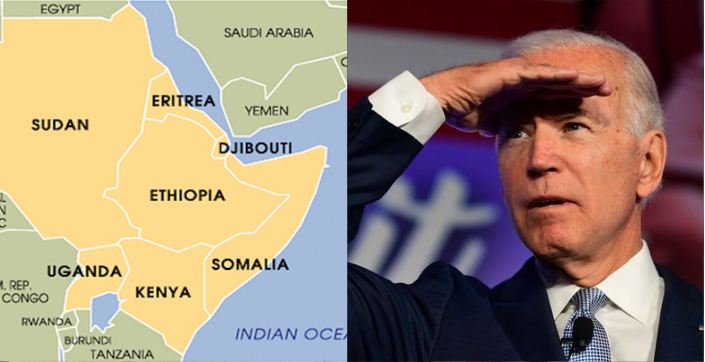Donald Trump is the only American President in the 21st century who didn’t start a war in any part of the world. Both Bush and Obama started some devastating wars, and it seems that Biden is replacing the legacy of pushing the United States into regime change wars. He is starting with Ethiopia, a strategically located country in the Horn of Africa.
Ethiopia is currently facing a rebellion in its Northernmost region, Tigray. The rebellion is led by a group called the TPLF. Sounds like Ethiopia’s internal problem right? But Biden administration claims that Ethiopia’s forces and officials are committing human rights violations, and therefore, the US must get involved with a ‘humanitarian intervention’. Anyway, it just so happens that Ethiopia neighbours countries like Djibouti, Somalia and Sudan in which the US wants to ramp up its presence.
US Secretary of State Antony Blinken said, “Should those responsible for undermining a resolution of the crisis in Tigray fail to reverse course, they should anticipate further actions from the United States and the international community.” He added, “We call on other governments to join us in taking these actions.”
Blinken added, “The time for action from the international community is now.”
Ethiopia’s Tigray region fell into a big crisis after Ethiopia’s Prime Minister Abiy Ahmed accused the Tigray People’s Liberation Front (TPLF) of organising an attack on a federal military base. The Ethiopian government then ordered the Army into Tigray, apart from declaring a six-month state of emergency. The US is now using the crisis in Tigray for intervening in the strategically located country.
The US Secretary of State wants us to believe that the United States will enter Ethiopia in order to rescue the regional crisis in the country. However, the real motivation behind US intervention in Ethiopia is geopolitical. The US wants a regime change in Tigray so that it can address regional changes.
Make no mistake, the US is losing influence in the Horn of Africa, the Northeastern part of Africa that serves as an entry point into the Continent of Africa, apart from being located close to the strategic chokepoint created by the Bab-el Mandeb Strait.
Ethiopia is located to the Southeast of Sudan, and West of Somalia. Ethiopia is itself a landlocked country, but it shares boundaries with Djibouti and Eritrea- the two African countries that form the Bab-el Mandeb Strait along with Yemen. The Bab-el Mandeb Strait ultimately connects the Gulf of Aden and the Red Sea and ensures access to Arab countries. This makes Ethiopia a vital location.
The US wants to establish its presence in Ethiopia, and address growing Russian and Chinese presence in the region. Presently, Russia and Sudan are re-negotiating a Russian naval base deal in the country.
Sudan’s military chief General Mohamed Othman al-Hussein said, “We’re in the process of renegotiating an agreement signed between the former government of Sudan and Russia regarding a Russian military project on the Sudanese Red Sea coast.”
al-Hussein added, “The agreement can be continued if we find benefits and profits for our country.”
On the other hand, the USA shares a strained relationship with Sudan. The Bill Clinton administration in the US had got the African country bombed in 1998. Subsequently, the US had imposed punitive sanctions on Sudan, which were lifted by Trump last year. Yet, the US and Sudan still don’t enjoy a very close relationship, whereas Moscow is looking to enhance cooperation with Khartoum.
In Somalia, the situation is only worse for the US. The United States’ ‘war on terror’ against Somalia starting in September 2001 embittered US-Somalia ties.
The US aligned with a group of warlords to counter the influence of jihadist groups in Somalia. Ultimately, the US alliance with warlords was defeated by Somalian jihadists. Also, the US strategy to take the aid of Ethiopian forces to fight Somalian jihadists led to the emergence of Harakat Al-Shabaab Al-Mujaahiduun (known simply as ‘Al-Shabaab’) in Somalia.
Today, Iran links with Al-Shabaab to funnel weapons to Houthis in Yemen. Russia and Iran have been cooperating closely to keep the US out of Somalia.
Finally, the US understands that Ethiopia is very close to Yemen, where the Arabs are fighting Iran-backed Houthis. The US already has a good military presence in Djibouti and therefore renewed presence in Ethiopia can be used to keep Yemen and the Bab-el Mandeb Strait in control.
Finally, the US is concerned about Djibouti too. China already has a military base in this small country, and Russia too wants to enter the small African country that hosts some of the biggest military powers in the world. Maintaining a good presence in neighbouring Ethiopia can help the US address China’s monetary and military outreach in the region, apart from keeping an eye on Russia’s growing military interests.
What the USA is going for in Ethiopia has many geopolitical and geostrategic ramifications. But the methods that the Biden administration is using to get into Ethiopia reek of the American Deep State’s tendency to use regime change wars as a means of expanding influence. Such “humanitarian intervention” often ignites decades of regional crises and violence.
